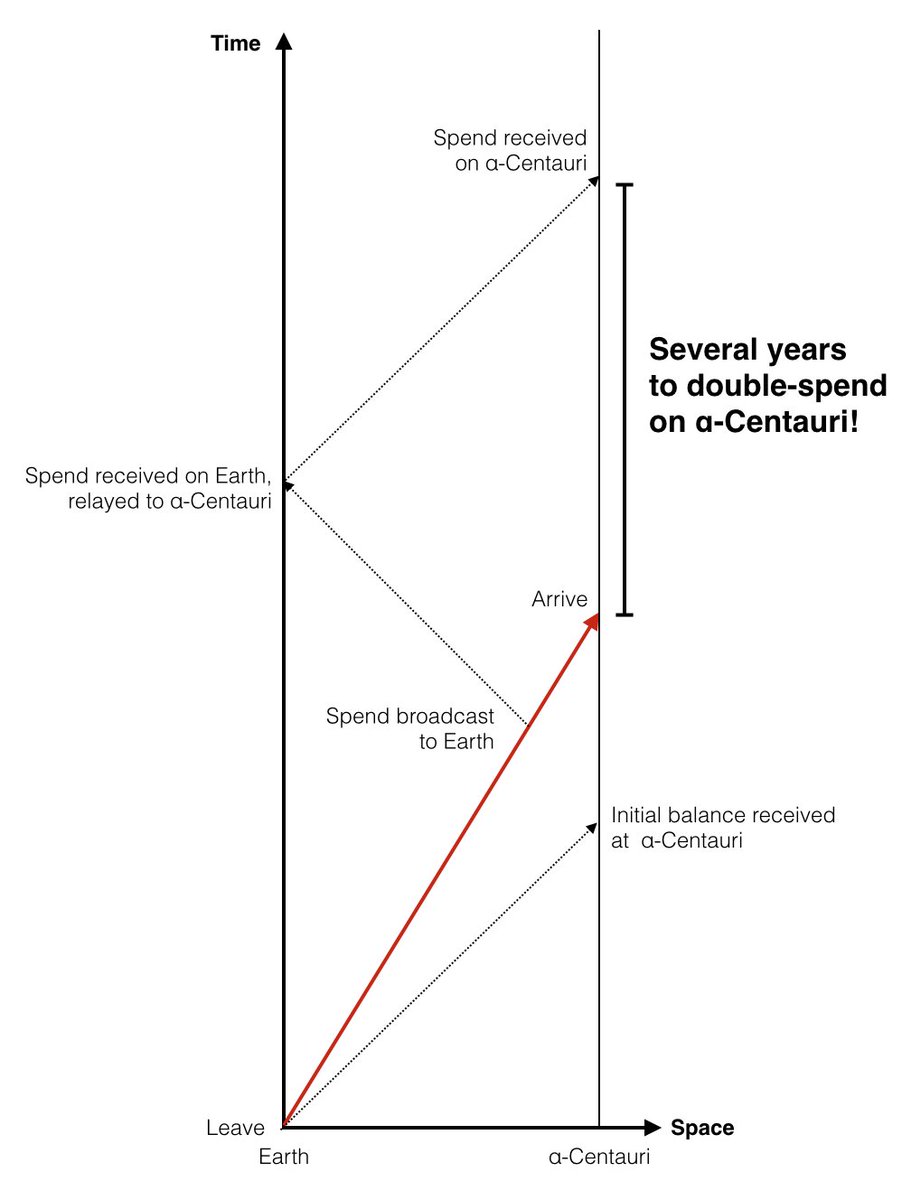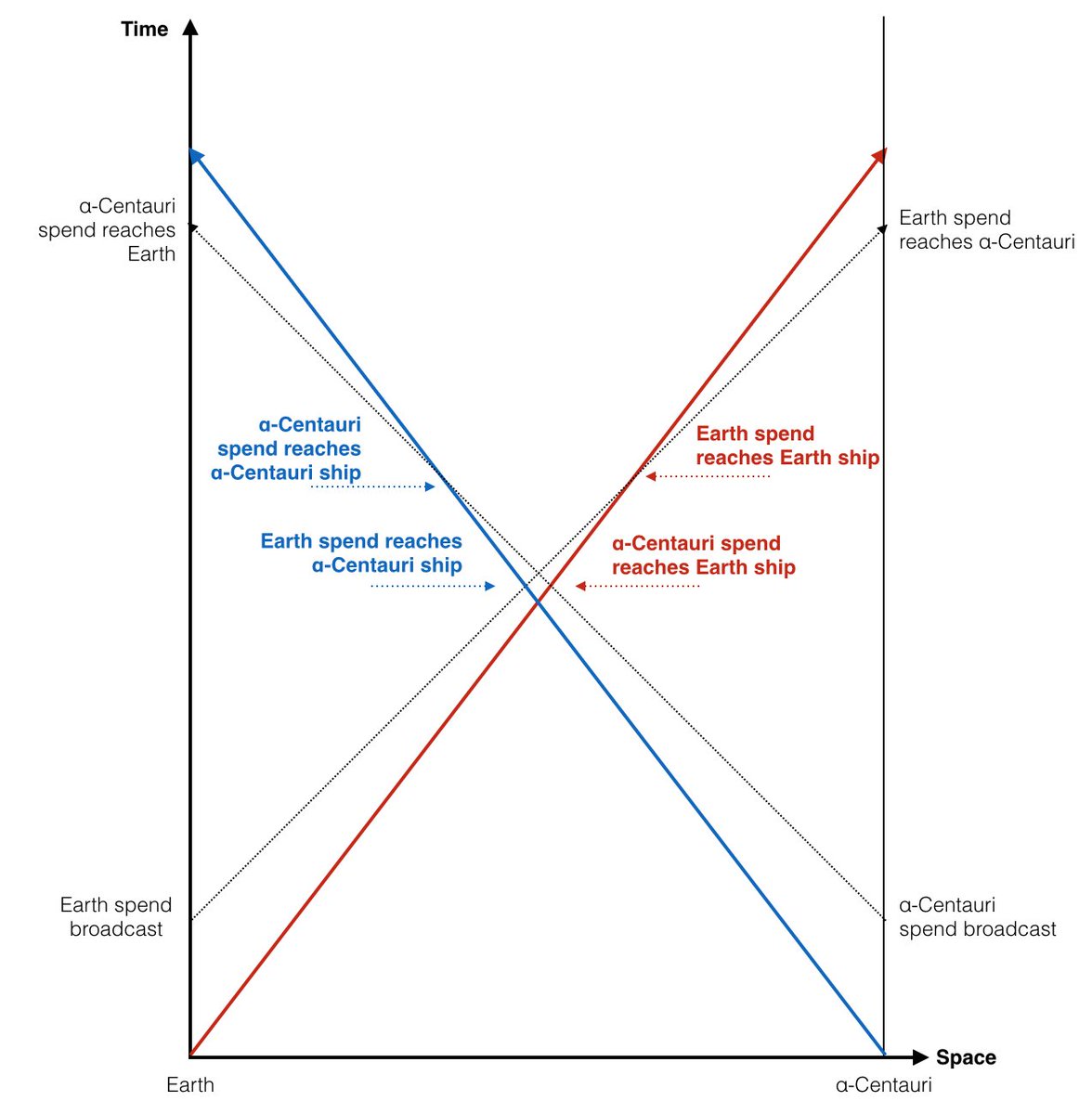1\ A thought experiment: The year is 2277. You're the bartender at a spaceport in a faraway Earth colony on a planet orbiting α-Centauri: a distance of ~4 light years. Guy walks into your bar, slams down a credit chit, and asks for a drink.
How do you know his money is any good?
How do you know his money is any good?
2\ If the credit chit were guaranteed by a bank or a blockchain or something local to α-Centauri it'd be easy, just like it is here on Earth in 2018.
But say this guy is fresh-thawed after his long journey from Earth aboard a lighthugger. What kind of wealth could he even have?
But say this guy is fresh-thawed after his long journey from Earth aboard a lighthugger. What kind of wealth could he even have?
3\ He's unlikely to be carrying base metals. Like natural resources, they'd still be valuable, but too heavy to transport from Earth. Physical fiat (bank notes) wouldn't be accepted either: too easy to 3D-print forgeries.
So what form of wealth survives interstellar voyages?
So what form of wealth survives interstellar voyages?
4\ Information! Wealth transfer between stars must be digital.
So the guy could present a statement from Bank of Orion or sign some blockchain transaction with his private keys to prove to you he is solvent.
"One Corellian Ale, coming right up sir..."
So the guy could present a statement from Bank of Orion or sign some blockchain transaction with his private keys to prove to you he is solvent.
"One Corellian Ale, coming right up sir..."
5\ But what if, just before arriving, the guy beamed a transaction back at Earth spending all his funds? It would take 4 years to get to Earth and 4 years for Earth to relay acknowledgement back to α-Centauri.
During those 8 years, he could double-spend freely on α-Centauri!
During those 8 years, he could double-spend freely on α-Centauri!
6\ Relativity can be confusing, so physicists use Minkowski diagrams to hone their intuitions in situations like these. Below is an idealized Minkowski diagram which depicts the scenario outlined above.
See en.wikipedia.org/wiki/Minkowski… for more details on how to read these diagrams.
See en.wikipedia.org/wiki/Minkowski… for more details on how to read these diagrams.

7\ Another problem: say two ships leave Earth and α-Centauri at the same time, each bound for the other. Later, both Earth and α-Centauri broadcast spends. Due to the relativity of simultaneity, the two ships will receive the spends in *the opposite order*! What should they do? 

8\ These examples are not pathologies. They are fundamental problems of interstellar commerce.
I read a lot of sci-fi but I don't know of many authors who write about interstellar distributed consensus. Everyone writes about the engines, but the money is just as vital...
I read a lot of sci-fi but I don't know of many authors who write about interstellar distributed consensus. Everyone writes about the engines, but the money is just as vital...
9\ I'm writing about these problems not just because they're fun but because I think they motivate clearer thinking about distributed systems here on Earth, today.
Also, I simply don't know the solutions! How would you solve these problems, if you were a future financier?
Also, I simply don't know the solutions! How would you solve these problems, if you were a future financier?
10\ I think that "long integration times" must be part of the solution: a 20-year "pending transaction period" for a bank or a 20-year target block time for a blockchain. Combine that with still "waiting for 6 confirmations" and you get century-long transaction timescales. #whoa
11\ Such a system could never be used for day-to-day transactions (space-coffees). Something else would be necessary.
Banks might let you borrow against your holdings in another star system until they can be transferred locally (and your opportunity to double-spend eliminated).
Banks might let you borrow against your holdings in another star system until they can be transferred locally (and your opportunity to double-spend eliminated).
12\ For blockchains, this problem could not be solved with bigger/faster blocks -- the only way to deal with the uncertainty caused by light lag is to wait.
Lesson: Different chains do different things. Layers (#LightningNetwork) and sidechains are necessary for space-coffees.
Lesson: Different chains do different things. Layers (#LightningNetwork) and sidechains are necessary for space-coffees.
13\ Hashpower ratios between star systems are also critical. If hashpower on Earth is many times that of α-Centauri, newly mined blocks on α-Centauri will constantly get uncled. Users on α-Centauri will only trust Earth blocks. Mining will become centralized to Earth: colonialism
14\ Today's analogy for light-lag is low-bandwidth: both limit your ability to mine and thus cause centralization. Some ignore this issue, but it's real.
Lesson: Increasing block sizes with constant network connectivity speeds disadvantages miners with low-bandwidth (~light-lag)
Lesson: Increasing block sizes with constant network connectivity speeds disadvantages miners with low-bandwidth (~light-lag)
15\ In summary, pondering these absurd scenarios may help you understand constraints on consensus inherent to the physical universe.
Analogies for these constraints can help us design better distributed systems today.
Also, don't tell me blockchains have no real use case :)
Analogies for these constraints can help us design better distributed systems today.
Also, don't tell me blockchains have no real use case :)
\16 ADDENDA: @vgr Provided two great links with more on this subject:
First is a wonderful article which addresses the issues I raised above in much more depth from @jasonmorton. I especially like the part about interstellar advertising :)
medium.com/@jasonmorton/r…
First is a wonderful article which addresses the issues I raised above in much more depth from @jasonmorton. I especially like the part about interstellar advertising :)
medium.com/@jasonmorton/r…
\17 The second is a 1978 thesis from famous Bitcoin-booster @paulkrugman ;)
Paul raises another fascinating problem: if time passes differently for observers in different reference frames, what's the best way to handle compounding interest?
princeton.edu/~pkrugman/inte…
Paul raises another fascinating problem: if time passes differently for observers in different reference frames, what's the best way to handle compounding interest?
princeton.edu/~pkrugman/inte…
• • •
Missing some Tweet in this thread? You can try to
force a refresh






